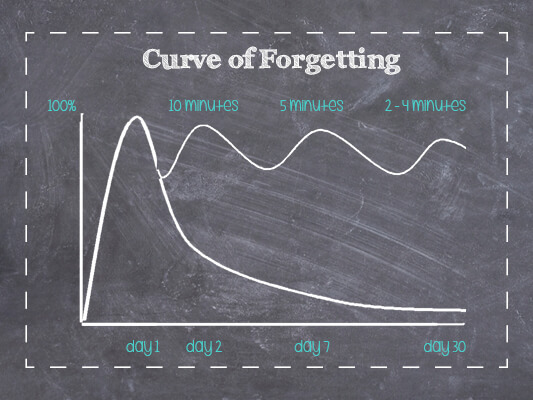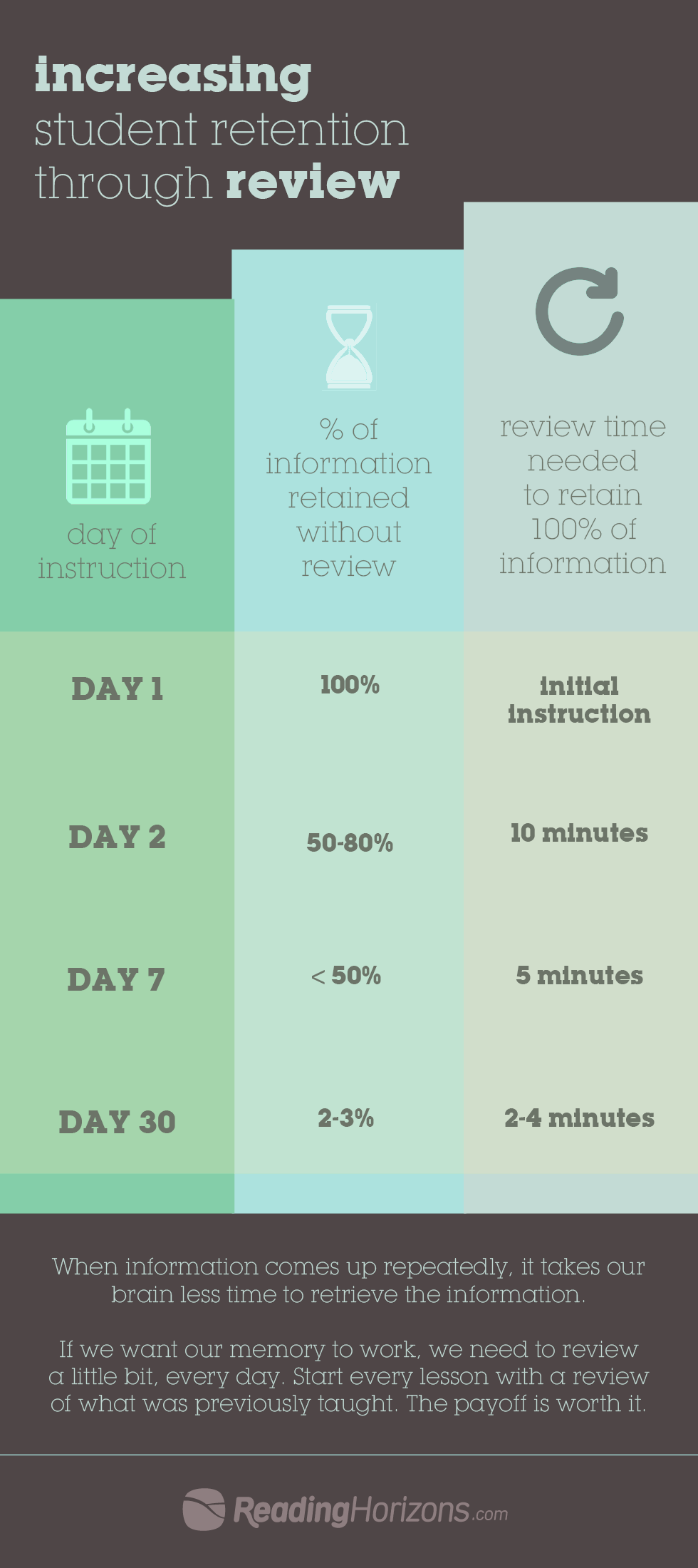We have busy schedules both in and outside the classroom. There’s so much to do. We have to keep pushing forward, moving on, but at what cost? We don’t want all we’ve taught our students to be forgotten as soon as it’s learned. How can we save time and increase the likelihood our students will remember what we’ve taught them during explicit phonics instruction? Is taking time out of our day, for review, worth it? How much time do we need to review?

The Curve of Forgetting shows us how we remember or forget information we’ve learned or memorized. The University of Waterloo, Counselling Services, published a paper describing this curve. Basically, they found on day 1, at the beginning of instruction, we assume our students know 0% of what is going to be taught. At the end of the instruction each student will know 100% of what each individual deemed important, however well they know it. Our brains discard the rest.
By day 2, if they have done nothing with the information that they’ve learned, if they don’t look at it, don’t think about it, don’t deal with it again, they will lose 50-80% of what they learned. That’s huge! The study tells us that our brain constantly stores little bits of information and if we don’t use that information or it doesn’t come up again, we just dump it.
By the time day 7 rolls around, what do you think happens? Exactly, we remember even less, and by day 30, if we haven’t thought about, revisited, or used the information we learned on day 1, we only remember 2-3%!
Long Term Memory in Action
It’s very common for our students to comment about how they’ve forgotten a phonics skill that has been previously taught. This doesn’t have to happen. The solution isn’t drill and kill or cramming. Research from Waterloo University tells us if information we’ve previously learned comes up repeatedly, our brain won’t dump it. Our brain tells us the information was important, so we’d better store it. When information comes up repeatedly, it takes our brain less time to retrieve the information or activate the information in our long term memory.
Increase Learning Retention
What can we do to help our students remember what we’ve taught them? If, within 24 hours of learning something, we spend just 10 minutes reviewing it, we’ll raise the curve from only remembering 50-80% to remembering almost 100%. That’s wonderful! After 7 days of learning something it will only take 5 minutes of review to remember about 100% of what we learned on day 1 instead of only 2-3%, if we hadn’t reviewed the information and reactivated our brains. That’s better yet! So what happens by day 30? You’ve guessed it! If we didn’t review and didn’t reactivate our brains, we’d remember less than 2-3% but if we just spent 2-4 minutes reviewing, our brain would be storing about 100% of the pertinent information and we could pull that information up when we wanted it. We’ve got it! Our brain must be constantly stimulated. If we want our memory to work, we need to review a little bit, every day. Start every phonics lesson with a review of what was previously taught. The payoff is worth it. Repeating or reviewing information is cumulative. We want decoding of words, remembering math facts, vocabulary, etc. to become automatic. We no longer need to consciously think about it because our brain is storing the information and working for us.
Review is worth the time. It doesn’t take long, but the benefits are priceless. If we are explicit in our instruction, actively engaging our students in their learning, and spending necessary time for review, our students will succeed. Remember, the best time for review is within a day or two after the material has been taught. Don’t give them time to forget! If we are sequential in our instruction, with constant review, we build a foundation on which our students can grow.
Pinterest Reference Guide

Schedule a call to learn how review is embedded throughout Reading Horizons elementary reading curriculum and reading intervention program.
Take a look at the following Reading Horizons Reviews: Reading Horizons Review from Goodlett Elementary School and Reading Horizons Review from Haleyville Elementary School.
